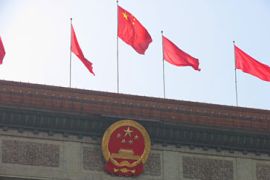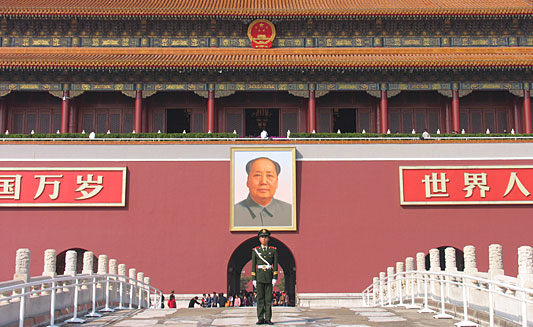Profile: Communist Party of China
With 73 million members, the CPC is the biggest political party in the world.

 |
| The party created by Mao continues to oversee all aspects of life in China |
Formally established at a secret meeting in Shanghai in 1921 when it claimed just 70 members, the Communist Party of China seized power in 1949 after its forces defeated the Nationalists in a bitter civil war.
On October 1 that year, Mao Zedong, having firmly established his grip on the communist party, began to exert that same grip on the Chinese nation.
Since then the CPC has ruled China as a one-party state, a position which is enshrined in the Chinese constitution.
Today the party that Mao created still pays homage to his image and still keeps an iron grip on power – but its ideology has changed fundamentally.
Growing support
With about 73 million members now, the CPC is the largest political party in the world.
| China Congress |
|
|
Indeed, while in many parts of the world communism is regarded as a spent force, membership of the CPC is actually growing.
According to recent figures, some 2.6 million new members joined the CPC in 2006, 160,000 more recruits than a year earlier.
One third of those new members were women and 80 per cent aged below 35, the result of efforts to make the CPC more representative of modern China, and hence more relevant.
It all springs from a drive to raise a new generation of party cadres – more adept at leadership than versed in ideology.
That aside, many new recruits join the party because membership – to coin a phrase – still has its privileges.
Perks include access to better jobs, better schools for members’ children and, perhaps most crucially, access to the country’s key decision-makers.
The party which once used to execute landlords and encourage the rooting out and public humiliation of “capitalist roaders”, today eagerly welcomes China’s new entrepreneurs into its ranks.
Guiding philosophy
| Party organisations |
|
National Party Congress – held every five years, bringing together more than 2,000 delegates from across China
Central Committee – 200 full members and 150 alternate members ‘elected’ by party congress delegates. In practice most are usually approved in advance
Politburo – Currently 24 full members and one alternate, nominally appointed by the party central committee.
Politburo Standing Committee – effectively the top decision-making body. Currently consisting of nine members
The Secretariat – the principal administrative arm of the party
Organisation Department – decides on promotions and performance, also charged with rooting out corruption |
The guiding philosophy is no longer found in Mao’s Little Red Book of quotations, but in the executive leadership and business strategy sections that dominate most Chinese bookshops.
But while China’s economy has gone full steam ahead into 21st century free-market capitalism, its political structure remains firmly tied to early 20th century Leninism.
Officially there is a division between the state, the People’s Republic, and the party – but in reality it is the latter that is the sole dominant power.
There may officially be a state position of defence minister, for example, but he comes well down the pecking order in terms of actually commanding China’s armed forces – a role taken by the chairman of the party’s Central Military Commission.
The centre of power and where all the key decisions are made lies with the nine members of the party’s Politburo Standing Committee.
How those decisions are made, however, remains a mystery.
Meetings are always held behind closed doors and decisions only announced later in state media.
From this pinnacle the party’s network extends through committees and administrative bodies, to provincial branches and eventually right down to millions of local level organisations, ensuring that – almost six decades after it first seized power – the communist party oversees virtually all aspects of life in China.
